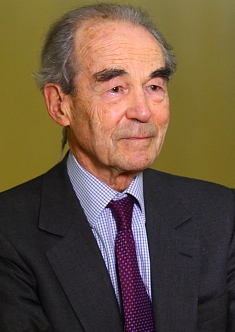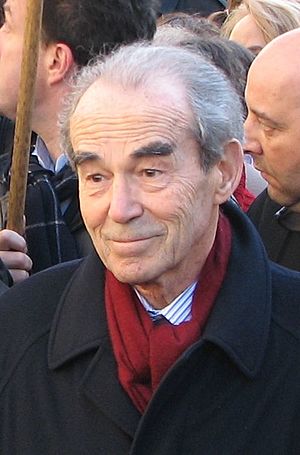Robert Badinter facts for kids
Quick facts for kids
Robert Badinter
|
|
|---|---|
 |
|
| Member of the French Senate | |
| In office 24 September 1995 – 25 September 2011 |
|
| Preceded by | Françoise Seligmann |
| Succeeded by | Philippe Kaltenbach |
| Constituency | Hauts-de-Seine |
| President of the Constitutional Council | |
| In office 19 February 1986 – 4 March 1995 |
|
| Appointed by | François Mitterrand |
| Preceded by | Daniel Mayer |
| Succeeded by | Roland Dumas |
| Minister of Justice | |
| In office 23 June 1981 – 19 February 1986 |
|
| President | François Mitterrand |
| Prime Minister | Pierre Mauroy |
| Preceded by | Maurice Faure |
| Succeeded by | Michel Crépeau |
| Personal details | |
| Born | 30 March 1928 Paris, France |
| Died | 8-9 February 2024 (aged 95) Paris, France |
| Political party | French Socialist Party |
| Spouse | Élisabeth Badinter |
| Children | 3 |
| Alma mater | University of Paris Columbia University |
| Occupation | Lawyer, professor, politician, activist |
Robert Badinter (born March 30, 1928 – died February 8-9, 2024) was a famous French lawyer, politician, and writer. He is best known for ending the death penalty in France in 1981. At that time, he was the Minister of Justice under President François Mitterrand. He also held many other important roles, working for justice and fair laws both in France and around the world.
Contents
Early Life and Education
Robert Badinter was born in Paris, France, on March 30, 1928. His parents were Simon Badinter and Charlotte Rosenberg. His family, who were Jewish, moved to France in 1921. They came from a region called Bessarabia to escape difficult times.
During World War II, when the Nazis took over Paris, his family moved to Lyon to find safety. Sadly, in 1943, his father was captured in a sad event where many Jewish people were taken. He was sent to a camp called Sobibor, where he died soon after.
Robert Badinter studied law at the University of Paris. He then went to the United States to continue his studies at Columbia University in New York City. There, he earned his Master of Arts (MA) degree. He kept studying at the Sorbonne until 1954. In 1965, Badinter became a professor at the University of Sorbonne. He taught there until 1996.
Political Career
Starting Out
Robert Badinter began his career as a lawyer in Paris in 1951. In 1965, he helped start a law firm called Badinter, Bredin et partenaires. He worked there as a lawyer until 1981.
Minister of Justice (1981–1986)
In 1981, François Mitterrand became president of France. President Mitterrand, who had always been against the death penalty, chose Robert Badinter to be his Minister of Justice.
One of Badinter's first big actions was to propose a law to the French Parliament. This law aimed to end the death penalty for all crimes, for both civilians and military members. After a lot of discussion, the law was passed by the Senate on September 30, 1981. On October 9, the law officially took effect, meaning the death penalty was no longer used in France.
Later Roles (1986–2024)
From March 1986 to March 1995, Robert Badinter was the president of the French Constitutional Council. This council makes sure that laws follow the French Constitution. From 1995 to 2011, he served as a senator, representing the Hauts-de-Seine area.
In 1989, he appeared on a French TV show about human rights with the 14th Dalai Lama. They talked about the loss of Tibetan culture in Tibet. Badinter used the term "cultural genocide" to describe it. He praised how Tibetans used peaceful ways to resist. Badinter met the Dalai Lama many times, calling him a "Champion of Human Rights" in 1998.
In 1991, Badinter was chosen to be part of a special group called the Arbitration Commission. This group helped with legal questions when Yugoslavia was breaking apart. He became the president of this commission.
Badinter also led the Court of Conciliation and Arbitration for the Organization for Security and Co-operation in Europe (OSCE) from 1995 to 2013.
He did not support Turkey joining the European Union. He was worried that Turkey might not be able to follow all the rules of the Union. He also thought about its location, saying it would make Europe neighbors with many regions that were not part of the original idea for the EU.
Badinter was highly respected in Macedonia because he said that using the name "Macedonia" should not mean any country was claiming land from another. He supported Macedonia becoming a fully recognized country in 1992. He also helped create the Ohrid Agreement in Macedonia. This agreement made sure that important decisions needed support from both the Macedonian and Albanian ethnic groups. This is often called the "Badinter principle."
In 2009, Robert Badinter was elected to the American Philosophical Society.
World Justice Project
Badinter was an Honorary Co-Chair for the World Justice Project. This project works to make sure that the rule of law is strong around the world. The rule of law means that everyone, including governments, must follow the laws. This helps create fair and equal communities.
Awards
Robert Badinter did not accept any honorary awards from the French National Order of the Legion of Honor or the Ordre National du Mérite. However, he did receive awards from other countries. These included the Order of Tomáš Garrigue Masaryk from the Czech Republic in 2001 and the Order 8-September from North Macedonia in 2006. Because he worked for so long to end the death penalty, Robert Badinter was made an honorary member of the International Commission Against the Death Penalty.
Personal Life
Robert Badinter was married to Élisabeth Bleustein-Blanchet. She is a philosopher and writer, and her father founded a well-known advertising company. Robert Badinter passed away during the night of February 8 to 9, 2024, at the age of 95.
Summary of Political Career
- President of the Constitutional Council of France: 1986–1995.
- Minister of Justice: 1981–1986 (He left this role when he became President of the Constitutional Council).
- Senator of Hauts-de-Seine: 1995–2011.
Images for kids
See also
 In Spanish: Robert Badinter para niños
In Spanish: Robert Badinter para niños
 | Jackie Robinson |
 | Jack Johnson |
 | Althea Gibson |
 | Arthur Ashe |
 | Muhammad Ali |




